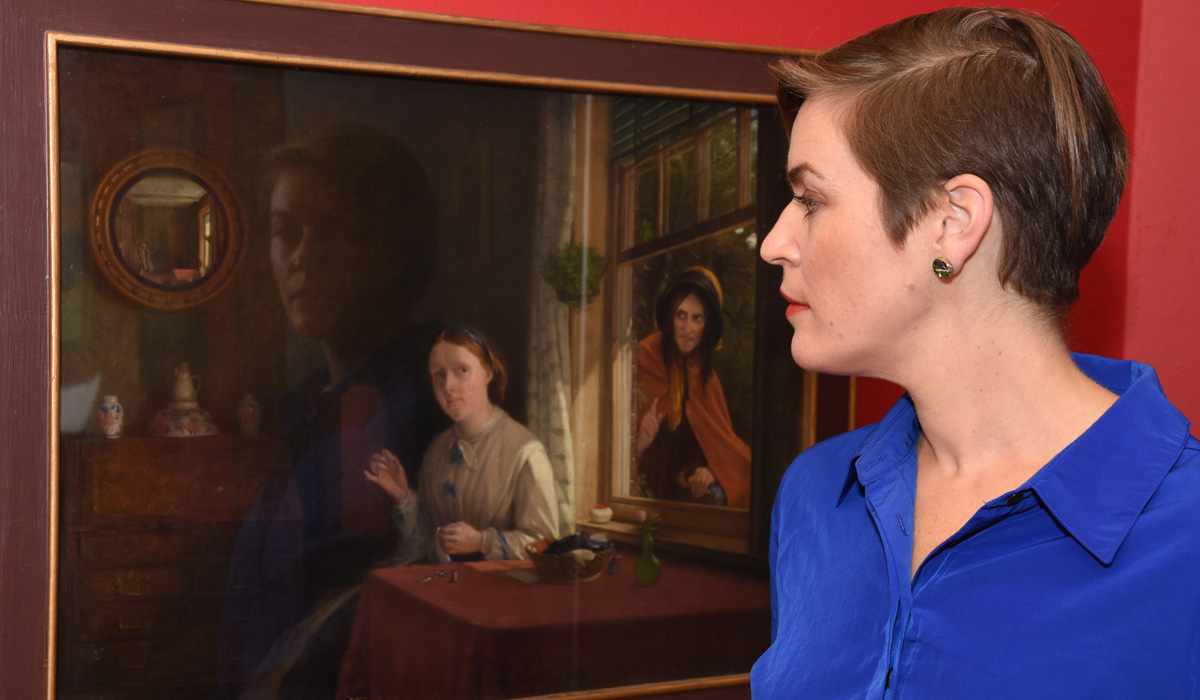Dr Jodie Matthews
Senior Lecturer in English Literature and Creative Writing
Dr Jodie Matthews’s book The Gypsy Woman looks at their slanted portrayal from the 1700s to today’s TV programmes, Big Fat Gypsy Weddings
EVERY period has its own Gypsy stereotypes, often a source of racism and hostility. In her new book, a University of Huddersfield lecturer describes and analyses them, drawing historical threads between a sensational court case of the 1700s and a controversial present-day reality show.
Most of the texts and artworks described by Dr Jodie Matthews in The Gypsy Woman date from the distant past, but she links them to a range of contemporary portrayals of female Gypsies on TV and film, such as a Romani character in the U.S. programme Buffy the Vampire Slayer.
And she describes Channel 4’s Big Fat Gypsy Weddings as “infamous”, citing its “exploitative, patronising, hysterical and exaggerated portrayal”.
“When we are thinking about the past, such as stereotypes from the 19th century of Romani women, we can only understand them from the standpoint of the present,” said Dr Matthews, explaining her “transhistorical” approach.
One of her chapters is based on a case from 1753, when a maidservant named Elizabeth Canning was allegedly kidnapped by a Gypsy woman named Mary Squires, who was condemned to death but later pardoned when it was found that her accuser had committed perjury.
Dr Matthews describes the long-lasting impact of the case and the stereotypes that it helped to bolster. The cover picture of The Gypsy Woman is an 1865 painting by Thomas George Webster that depicts a pale-skinned young woman menaced by a sinister, dark-haired female Gypsy outside her window. The painting hangs in the Smith Art Gallery in Brighouse.
 Dr Jodie Matthews is pictured with the 1865 painting 'The Gypsy Woman' by Thomas George Webster which is on display at the Smith Art Gallery in Brighouse
Dr Jodie Matthews is pictured with the 1865 painting 'The Gypsy Woman' by Thomas George Webster which is on display at the Smith Art Gallery in BrighouseGypsy Women
Dr Matthews also claims that supposedly positive portrayals of Gypsy women can be detrimental.
“There is a conception is that all Gypsy women must be fortune tellers and dark-haired, dark-eyed beauties,” she says. “What about being a strong and educated blonde-haired Romani woman? What about being a politician? What about a life beyond the stereotype? The trouble with these stereotypes is that they tell the same story again and again.”
Dr Matthews is a Senior Lecturer in English Literature at the University of Huddersfield and the representation of Romani people has been a key area of research. Earlier this year, she curated an exhibition in Leeds that displayed a wide range of material on the subject. She discusses it in a special online video.
She was asked by the publishers to write The Gypsy Woman in order to fill a gap.
“In popular culture, there is a lot of interest in programmes such as Big Fat Gypsy Weddings and there has been a great deal of academic research in disciplines such anthropology and the social sciences, but literature studies had lagged behind a little,” she said.
Another group of travelling people researched by Dr Matthews are the men, women and families who lived on its waterways. She is the Canal and River Trust’s first Honorary Research Fellow and was filmed as she was about to embark upon the research, which can be seen in the video below.
- The Gypsy Woman: Representations in Literature and Visual Culture is published by I.B. Tauris.
In this video, Dr Jodie Matthews describes her research into the people who lived and worked on Britain's canals as she travels the picturesque waterways, including Huddersfield's Narrow Canal, which was completed in 1811 and runs through the middle of the University's campus in Huddersfield.
The sacrifice made by nurses in WWI
Professor Christine Hallett has recently been appointed as Professor of Nursing History and has written a number of books on the subject
Holocaust Exhibition and Learning Centre opens
The Centre has been developed by University of Huddersfield and the Holocaust Survivors’ Friendship Association
Historian appears on BBC Radio 4’s In Our Time
Dr Lewis makes her third appearance on the Radio 4 programme where she will be discussing Shakespeare’s versions of history
